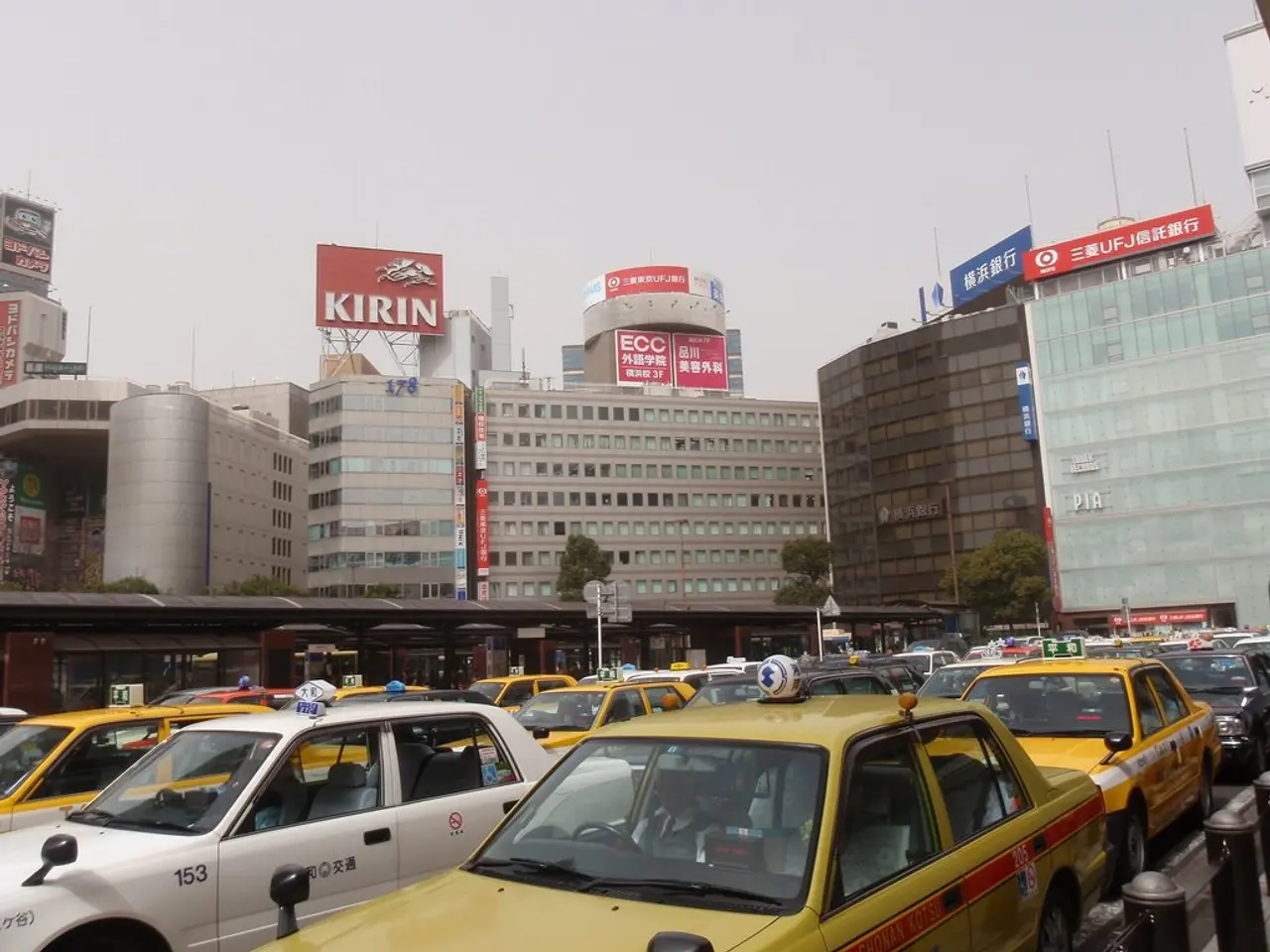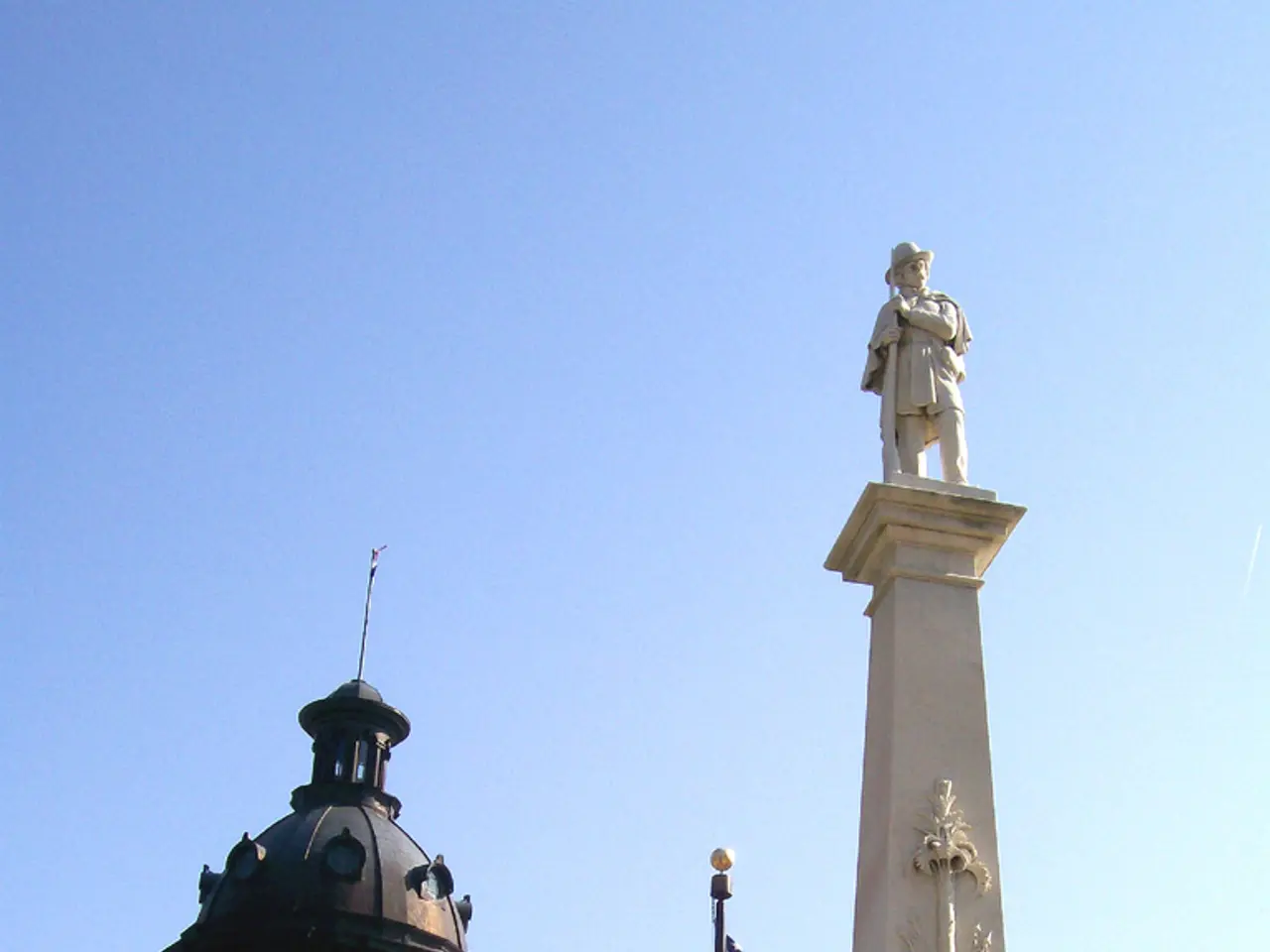Sheikh Mohammed embarks on a journey with Etihad Rail, traveling from Dubai to Fujairah, assessing the advancement of the project.
The UAE's highly anticipated Etihad Rail project, set to commence operations in 2026, is projected to generate an impressive Dh200 billion in economic benefits over the next 50 years [1][2][3]. This significant economic boost will be achieved through various means, including major savings in transport costs, reduced road congestion, and the unlocking of long-term economic value from improved freight and passenger connectivity across the country [1][2][3][4].
The rail network, spanning 11 cities and regions from Al Sila in the west to Fujairah in the east, will connect key urban centres and regions, dramatically cutting travel times between major cities [6]. For instance, the journey from Abu Dhabi to Dubai will take just 57 minutes, while the trip from Abu Dhabi to Fujairah is expected to take around 105 minutes [6].
The Etihad Rail project aims to strengthen urban connectivity and reduce reliance on cars and trucks, with each freight train on the network eliminating up to 300 trucks from UAE roads, easing congestion and reducing pollution [7]. This reduction in road traffic is expected to lead to Dh22 billion in savings from fewer road accidents and Dh8 billion in lower road maintenance costs over the next 50 years [8].
The passenger service of the Etihad Rail is projected to boost domestic tourism, generating Dh24 billion in tourism revenue over the next 50 years [9]. By 2030, the train is expected to serve 36 million passengers annually [5].
Sheikh Mohammed bin Rashid Al Maktoum, Vice President and Prime Minister of the UAE and Ruler of Dubai, has expressed pride in the Etihad Rail project and the nation's continuous work on future infrastructure [4]. In a show of confidence, he recently took a test ride on the Etihad Rail passenger train from Dubai to Fujairah [10].
The Etihad Rail project, as part of the Dh50 billion National Railways Programme, is expected to deliver Dh200 billion in economic gains [1]. These benefits are not limited to economic growth, as the rail system is also projected to cut land transport emissions by 21% annually by 2050, the equivalent of 8.2 million tonnes of CO2 emissions each year [2].
In conclusion, the Etihad Rail project promises to revolutionise transportation in the UAE, delivering substantial economic benefits, improving urban connectivity, reducing emissions, and enhancing the nation's infrastructure. The project is a testament to the UAE's commitment to sustainable development and future-focused infrastructure.
[1] Khaleej Times. (2021, March 1). Etihad Rail's Dh200bn economic benefits expected over 50 years. Retrieved from https://www.khaleejtimes.com/government/local/etihad-rails-dh200bn-economic-benefits-expected-over-50-years
[2] Gulf News. (2021, March 1). Etihad Rail to cut land transport emissions by 21% annually by 2050. Retrieved from https://gulfnews.com/uae/government/etihad-rail-to-cut-land-transport-emissions-by-21-annually-by-2050-1.73940340
[3] WAM. (2021, March 1). Etihad Rail to unlock Dh200 billion in economic benefits over 50 years. Retrieved from https://wam.ae/en/details/1395302804606
[4] WAM. (2021, March 1). Sheikh Mohammed bin Rashid Al Maktoum praises Etihad Rail project. Retrieved from https://wam.ae/en/details/1395302804606
[5] Khaleej Times. (2021, March 1). Etihad Rail to serve 36 million passengers annually by 2030. Retrieved from https://www.khaleejtimes.com/government/local/etihad-rail-to-serve-36-million-passengers-annually-by-2030
[6] Khaleej Times. (2021, March 1). Etihad Rail to significantly cut travel times between major cities. Retrieved from https://www.khaleejtimes.com/government/local/etihad-rail-to-significantly-cut-travel-times-between-major-cities
[7] Gulf News. (2021, March 1). Etihad Rail to reduce reliance on cars and trucks. Retrieved from https://gulfnews.com/uae/government/etihad-rail-to-reduce-reliance-on-cars-and-trucks-1.73940337
[8] Gulf News. (2021, March 1). Etihad Rail to save Dh22 billion from fewer road accidents. Retrieved from https://gulfnews.com/uae/government/etihad-rail-to-save-dh22-billion-from-fewer-road-accidents-1.73940339
[9] Gulf News. (2021, March 1). Etihad Rail to boost domestic tourism, generate Dh24 billion in tourism revenue. Retrieved from https://gulfnews.com/uae/government/etihad-rail-to-boost-domestic-tourism-generate-dh24-billion-in-tourism-revenue-1.73940342
[10] Gulf News. (2021, March 1). Sheikh Mohammed bin Rashid Al Maktoum takes test ride on Etihad Rail passenger train. Retrieved from https://gulfnews.com/uae/government/sheikh-mohammed-bin-rashid-al-maktoum-takes-test-ride-on-etihad-rail-passenger-train-1.73940341
- The Etihad Rail project, a part of the Dh50 billion National Railways Programme, is projected to generate an impressive Dh200 billion in economic benefits over the next 50 years, while simultaneously reducing reliance on cars and trucks in the business sector, thereby saving Dh22 billion from fewer road accidents and Dh8 billion in lower road maintenance costs [1, 8].
- The rail system, envisioned to span 11 cities and regions from Al Sila in the west to Fujairah in the east, is anticipated to not only revolutionize transportation within the UAE but also significantly contribute to the environment, aiming to cut land transport emissions by 21% annually by 2050, the equivalent of 8.2 million tonnes of CO2 emissions each year [2].
- With the passenger service of the Etihad Rail projected to boost domestic tourism, generate Dh24 billion in tourism revenue over the next 50 years, and serve 36 million passengers annually by 2030 [4, 9], this infrastructure development is expected to have a profound impact on the travel industry, enhancing the nation's overall connectivity.




